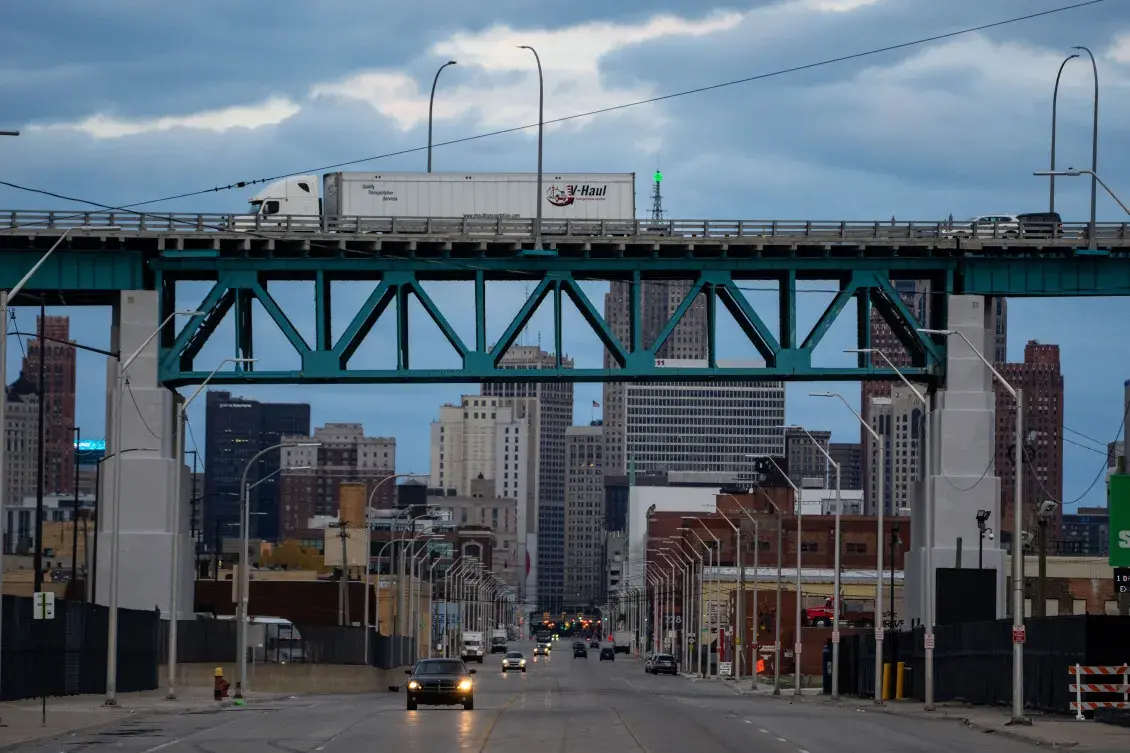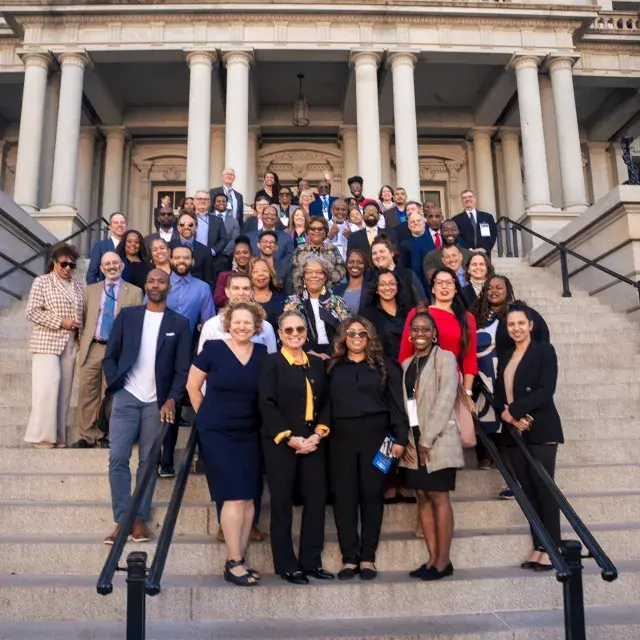Look upward in downtown Detroit and you’ll see ornate skyscrapers built even before the city’s automotive-fueled heyday of the 1950s, when it was the richest city in the country. Lower your gaze, and the bevy of cranes offers signs of renewal. At street level, crowded restaurants and busy sidewalks create an urban buzz familiar to any city dweller.
For Melinda Clemons, this activity is a positive sign, as her hometown builds back from the national foreclosure crisis in 2008 and municipal bankruptcy five years later. “There is a vibrancy in this city,” said Clemons, Enterprise’s vice president and Central Midwest market leader. “But a lot of the cranes you see and the construction that’s going on – it’s not for affordable housing. We still have a long way to go here.”
For the city of Detroit, which spreads out over 139 square miles, the list of problems can seem unsurmountable: high poverty rates, widespread housing disrepair, struggling public schools and health care system.
For all the ongoing challenges, there are also areas for optimism as community organizations reinforce neighborhoods, local foundations support economic development, and Black-led developers make progress in efforts to rebuild their city.
We do what we can to address a part of the larger problem. There are plenty of big issues, but also a lot of great minds coming together to think about how we dismantle decades of disinvestment.
Clemons spoke to us recently about her team’s work to support community development, home repair, and rebuilding neighborhoods in Detroit.
How would you describe housing affordability right now in the Detroit area?
It’s a huge challenge and still very precarious here. We are short an estimated 20,000 affordable homes in Detroit and our current housing stock is in much need of repair. There are a lot of people who are underhoused, which means they are living in conditions that are not ideal – sometimes without running utilities. Or we have families that have fallen prey to landlord scams and predatory land contracts.
At the same time, there are millions of dollars of market rate housing under development. To receive public subsidies, our city ordinance requires 20% of units to be rented at 80% of area median income (AMI) or below. The challenge is that due to income disparities and inequities in our region, the cost of 80% of AMI is too expensive for most Detroit residents. We’ve come a long way, but we have a long way to go.
What makes Detroit unique when it comes to housing and economic development?

Detroit used to have one of the strongest Black middle classes and a high rate of homeownership, stemming from the great migration from the South and the good jobs offered by the automotive industry. Over the last several decades, Detroit has been hit by major challenges, including the loss of middle-class jobs, population decline, the foreclosure crisis, and more. In the aftermath of the foreclosure crisis, individuals and companies have come in to buy large parcels of single-family homes at $5,000-$10,000 each. Now, companies are purchasing homes to hold as rental properties. And as a result, we have limited inventory for first-time home buyers.
What’s different in Detroit, compared to many other large cities, is that our affordability challenges stem less from the high cost of renting or purchasing and more from the low wages residents earn. Our poverty rate is so high – thirty percent— that even if a nonprofit wants to build affordable housing, there is so much subsidy that is needed, it’s almost insurmountable. Finally, most of the homes in the city, whether they’re being rented or sold, have a lot of rehab and repair needs, which makes the true cost of living in them much higher than the ticket price.
What do the federal government and country at large need to know about Detroit to help improve conditions for residents?
As I was mentioning, the condition of our housing stock is problematic. If we really want to get over challenges, such as lead paint, roof replacements, cooling and plumbing systems not working properly in a home – all these things will need enormous subsidies. We need a bigger outlay of federal funding because of the scale of these challenges. In Detroit, we’re coming from such a place of deficit that we need more to get to the starting line with everyone else.
What happened here in 2008? Did the country’s foreclosure crisis hit Detroit especially hard and what was the impact?
In 2008 there was a foreclosure crisis that happened all over the country, but it was very bad here. People were illegally being foreclosed on. There was a mass transfer of wealth from the Black population after the recession. Now we are a renter city, where we used to be a home ownership city. We are still trying to recover.
And there are many barriers to becoming a homeowner. People who have lived here their entire lives cannot access a $50,000 mortgage because there are not many banks that offer mortgages of that size. So instead, many people buy on land contract, which can be predatory. Frequently, as soon as you miss a payment or break any terms of the contract, you are at risk of losing the home and the equity you put into it.
You recently celebrated the success of the Detroit CDO Fund. What have you learned from the past three years, and what are your hopes as a new round of funding comes together to support Community Development Organizations (CDOs) in Detroit?
When you have predictable funding models, it frees up organizations to be more responsive to the needs of their communities. All our CDOs have been able to scale their work because of the additional funding and technical assistance. Before, many of these organizations were largely just scraping by. Now they can advance their work and pilot new initiatives, which is so important because they’re filling a gap.
Another lesson has been seeing how nonprofits operate in other places. Each year, the CDO group goes on a learning exchange. Last year the group went to New Orleans, where people are facing a lot of similar challenges, and where they launched a local CDO fund. These dialogues have helped our CDOs expand their work.
What’s the promise of the Detroit Home Repair Fund after one year?
The promise is that more and more community-based organizations and nonprofits are interested in single-family home repair and participating in some form of home repair program. This is critical for our neighborhoods because over 80% of our housing stock is single-family.
As I’ve mentioned, there’s such a need for affordable housing, but when we think about affordable housing, we often think of subsidies for multifamily rental units. Here, so much of the need is for owner-occupied single-family homes that are in such disrepair that households are at risk of displacement.
Preventing displacement is crucial for so many reasons, including that we want families’ homes to be an asset they can pass on to the next generation, helping them build wealth and ensuring stability.
How does being from Detroit inspire you and others on your team to do this work?
First, it makes us more compassionate. Most of us grew up in Detroit, and the systems we are trying to change affect our family, friends, and neighbors. The same people we work with and serve are the same people we go to church with, see at the grocery store, and run into at the park. It makes it personal for us.
What is Enterprise doing right now to preserve and improve the housing stock in your area?
In addition to some of our programmatic and policy work, we are also bringing flexible capital to the market. Through our Equitable Path Forward initiative, we have eight black lead development firms receiving unsecured lines of credit to build the capacity of their organizations. They range from small-scale market rate to large-scale affordable housing and everything in between. We are looking for ways to move the needle, and five years from now, we expect to see a continued improvement in the quality of our housing and a strengthening of our BIPOC developer ecosystem.
What are you most hopeful about regarding solving the housing affordability crisis in your area?
I’m hopeful about the large-scale federal funding resources. For example, with ARPA Funding and the Inflation Reduction Act dollars – it’s a once-in-a-lifetime opportunity to get a large bundle of resources to address some of these big problems. We also have more opportunities to collaborate with like-minded stakeholders. There are more CDFIs and foundations in the city of Detroit than ever before, and we are collaborating with each other.
And there are real achievements. We now have a Community Benefit Ordinance and an affordable housing strategy, which Enterprise is helping execute. Our riverfront has been reactivated. When I think about all of that, I am hopeful.

